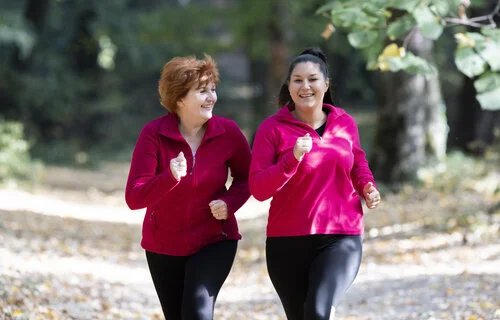12 Amazing Reasons Why Walking Is Magic ~via @99walks on Instagram
There’s something that happens when you take a walk. Your burdens feel lighter. Your mind becomes clearer. Your breath grows deeper, and your body just feels better. And, while you are at it, your heart grows stronger, your stress lessens, your brain grows bigger and your life gets longer. With the power of small steps forward, you’ll discover the transformation of your mind, mood and body. It’s why we say walking is magic.
Over the past several decades, researchers have begun to unravel the magical power of an intentional walking practice. Here’s just some of what they have to teach us.
Walking lifts your spirits and reduces stress. Stress is almost inevitable, but walking reduces levels of the stress-hormone cortisol and increases the trifecta of happy hormones: endorphins, serotonin, and dopamine. A walk is a powerful, all-natural mood booster, leaving you feeling, well, just downright happier!
Walking reduces your blood pressure. Studies have shown that regular and consistent exercise, like walking, reduces high blood pressure and helps you sustain the benefits over time. It’s even found that shorter bursts of activity for women throughout the day—like a 3-10-minute walk multiple times a day—can help you maintain lower blood pressure throughout the day and into the days following.
Walking boosts your immune system. It might sound too good to be true, but research shows walking can help boost your immune system and improve your ability to fend off viruses and bacteria. One study showed people who walk at least 20 minutes a day 5 days a week have 43 percent fewer sick days than those who did not. And for those who did get sick, the severity of the illness and symptoms were reduced.
Walking is good for your heart. People who maintain at least a moderate level of fitness are more likely to ward off coronary heart disease, even if you have a family history, or suffer from high blood pressure or obesity. The American Heart Association recommends moderate-intensity aerobic (endurance) physical activity for a minimum of 30 minutes, five days a week, to promote cardiovascular fitness.
Walking can help fight certain types of cancer. An American Cancer Society study found that just 2.5 to 5 hours of moderate-intensity activity, like walking, per week lowered the risk for several cancers including colon, breast, endometrial, kidney, multiple myeloma, liver and non-Hodgkin lymphoma. In fact, women were found to have a 6% lower risk of breast cancer, 10% lower risk for endometrial cancer, and an 11% lower risk of non-Hodgkin lymphoma, with these percentages increasing as weekly activity increases.
Walking helps your brain. Walking has been shown to increase the size of the hippocampus, the section of the brain important to learning and memory. In addition to its well-documented role in memory function, recent research demonstrates that the hippocampus also plays a role in executive function, processing speed, intelligence, path integration and spatial processing. With this size increase, seniors have been able to maintain their memory and experience less cognitive decline which helps to prevent dementia. In fact, walking 6 miles a week results in a 50% reduction in the risk of Alzheimer’s disease, according to research by radiologists from the University of Pittsburgh and New York-Presbyterian Hospital.
Walking helps you lose weight. Walking is a great way to burn calories, but it can also help offset genetic tendencies towards obesity. According to a Harvard study, one hour of walking a day can reduce these influences by half. One recent study showed light-sensitive proteins on your fat cells can detect sunlight, and too little natural light can alter how these fat cells behave. The result? Higher sunlight exposure may suppress your appetite, helping to prevent obesity.
Walking increases your energy. Ever notice that, even if you start out feeling tired, you end a walk with more energy than you started? You’re right. In fact, a study from the University of Georgia showed that “sedentary people who regularly complain of fatigue can increase their energy levels by 20 percent and decrease their fatigue by 65 percent by engaging in regular, low intensity exercise.”
Walking helps you sleep better. Walking outdoors, especially in the morning, can help your body get in tune with your natural daily rhythms. According to research reported by Johns Hopkins Center for Sleep, there is solid evidence that exercise does, in fact, help you fall asleep more quickly and improves sleep quality. In fact, the research shows that 30 minutes of moderate aerobic exercise—like walking—can improve the quality of that night’s sleep.
Walking helps you focus. Feeling like your mind is all over the place? The act of your feet hitting the ground stimulates blood flow, sending oxygen to your brain, which in turn gives you the ability to focus better. The increase in connectivity and coordination of important brain networks improves your cognitive function—your thinking skills. This study, published in Frontiers in Aging Neuroscience, found that participants who were more physically active performed better at planning, prioritizing, strategizing and multi-tasking.
Walking helps with creativity. Let walking feed the creativity you need. A fascinating study from Stanford University showed that a short walk can increase your creativity by up to 60% and that boost in creativity can last for several hours following that walk. You can walk indoors or out — the location doesn’t matter — but putting your feet one in front of the other really gets the juices flowing.
Walking combats loneliness and creates connection. Whether shoulder-to-shoulder or via phone, taking a walk with a loved one is truly magical. Not only is it meditative, but the increased oxygen and blood flow helps you communicate more clearly and listen more carefully. According to this Tedx Talk by 99 Walks Co-Founder Joyce Shulman, women who regularly walk with their friends are 2.5 times less likely to be lonely.
The list of health and wellness benefits, both physically, mentally and emotionally, are bountiful. Bottom line? Walking can help with virtually every aspect of life. No matter your age, location or fitness level, everyone can realize the benefits of a regular walking practice. All it takes is lacing up a comfortable pair of shoes and walking out your door to begin experiencing the magic of walking.
Many women struggle with the motivation to get healthy, but it doesn't have to be hard. Join thousands of women who are crushing their goals with 99 Walks, a fun and motivational walking challenge for women. Set your goal, walk your miles and earn an inspirational bracelet.
You'll find all the tools you need to be successful, including a tracking app with an extensive library of walking classes, daily inspiration and a supportive community to keep you going.
Take your first step towards health and happiness, all through the simple act of walking. Start today with two weeks free.




